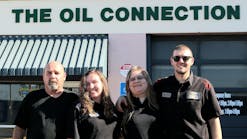Giving Others a Hand Up: Assessing Your Corporate Social Responsibility
California was on fire; Houston, Florida, Puerto Rico, U.S. Virgin Islands and other areas were affected by hurricanes. You're asking yourself what does all this have do with my service center? I hope this is a question we all ask ourselves, because if we are asking ourselves, the answer is clear. Everyone needs to be involved even if these terrible weather events did not strike you directly.
Assessing Your Corporate Social Responsibility
Is corporate social responsibility already a part of your brand personality? If not, consider a study by Cone Communications that found 84 percent of global consumers seek out responsible products when possible. You are probably thinking: I'll let the large national brands, or my franchisor, take care of those issues. Many of the large brands do support some of the major issues. But even if you have one store, you are not too small to develop a policy of social responsibility. When the heart of your brand personality is caring about others, your customers will notice. You will stand out from other service centers that only concentrate on their short-term profits. If your business doesn't support a non-profit, your customers may go elsewhere. When you support a non-profit, the customers from those that don't could consider switching to you.In fact, customers share their experiences with others. What will they say about you that will make you stand out from another service center? Will they leave your shop thinking this service was OK, or will they leave feeling that you're special? If your customers feel you are special their awareness of your service will increase, along with your sales. When you care about others, your customers will feel safe with you and trust you. This safe feeling will lead to a higher trust in your recommendation rather than a feeling that you are only trying to sell them more services. When they know you care about those in need, they will trust you. When you suggest additional services for their vehicle, that trust will let them know you are protecting them from future costly repairs or breakdowns and not trying to sell unnecessary services.
Now that I have your attention, the question is: what can you do or how can you help others being just a small lube shop?
First, think about your brand personality as if your brand was a person. Would you like this person, what would he/she look like? If you do not like them, how would you change this person? Can you count on your close friends, or are they selfish, self-centered friends? Do they really care about you, or are they only reaching out to you when you are in need?
Since you want your customers to be loyal customers who keep coming back to you, you must demonstrate that you care for them. They are more than just another sale. To accomplish this, you must gain their trust. Your customers will trust your store over another because you have demonstrated your support for others, not just yourself.
Getting Your Team Onboard & Evaluating Non-Profit Partners
I hope you are considering giving social responsibility a try! If so, the first item for discussion is, with so many options available, how to choose which one is right for you.The first step is to tell your team members what you are planning. Get their input, and seek their suggestions. Everyone has some experience where they needed some outside help. Listen carefully to their suggestions. Give each member sufficient time to tell you their entire story. Ask them for suggestions on how their store team can help. You can invite the different organizations you are considering to a team meeting to discuss how they are helping those in need. Ask them how they think you can be the most help.
Be sure to pick a cause you will be passionate about. When you and your team truly care, you will make a difference.
Get your customers involved and let them know how you are helping others. Produce in-store point of sale materials that tell your story. Add your cause to all your print materials, even if it's just one line. Use social media to tell your story, and ask others to join your efforts.
Let's discuss a few possible considerations that might be a good choice. What possible causes relate to your business?
We are all in the oil business, so environmental concerns or recycling issues are good examples. Promote the recycling you are already performing. Look for other ways to recycle products, and reach out to the community to use your expertise in leading other environmental and recycling issues.
Get your team involved in community service. Encourage them to participate. It could be as simple as packing weekend lunches for kids who do not to have food when they don't have school. Contact your local churches and community service clubs asking their suggestions for service opportunities. Consider offering your team members incentives or asking them to accept allocating a certain amount of their work hours to volunteer. The salary cost for these hours could be part of your commitment to make a difference in your community.
Add your support to fundraisers that are already established. Donate special gift certificates to support donations from different causes. Create a coupon book to sell your customers with special coupons. Use the book revenue for your cause.
There are many other ways to help those that are in need. Just do something.
Natural Disasters Creating More Need
So far, we have discussed how and why you should help those in need in your local communities. Those needs will always be there and deserve your attention and support.The natural disasters of 2017 created many communities with needs far beyond their local abilities to solve.
Several years ago, I worked in Houston. During that time, I developed many close friends. Through email and social media, they shared their pictures of the aftermath of Hurricane Harvey. They also told me their personal stories; some lost everything. My heart was broken, and I knew that I must do something. But what? With so many needs, what could I do from here? Just as I was trying to answer that question, Hurricane Irma came through Puerto Rico, the Virgin Islands, Florida and up the East Coast. In addition, fires were raging in California. How will our country be able to assist these communities without help from all of us? Now, my decision-making started, what could I do?
Finding My Cause
Just as you should do before you make your decision, I began researching community needs along with the organizations that were helping with those needs.I not only wanted to help those communities that were the victims of these disasters, but also find a long-term need I could serve here locally.
After researching worthwhile organizations, I found a deserving organization that surprised me - being a male from the automotive industry. I became emotionally connected to one organization after discovering a few startling facts. The local group I'm supporting is Babycycle Diaper Bank, who is a member of The National Diaper Bank Network and Baby2Baby National Network. As I said, a surprising answer that I was not looking for nor did I expect.
After extensive research, I discovered the following statistics for diaper need.
- Baby2Baby is a non-profit organization providing low-income children, ages 0-12 years with diapers, clothing and all necessities that every baby deserves.
- Low-income families pay up to 14 percent of their after-tax income on diapers.
- Disposable diapers cost $70 to $80 per month.
- Infants require up to 12 diapers per day; toddlers about 8.
- Childcare centers often require a six-to-eight-day supply for children to attend or enroll. This creates a barrier for parents to re-enter the workforce and perpetuates the cycle of poverty.
- Many parents are struggling to afford diapers and must make choices no parent should ever have to make - like buying food or diapers for their baby.
The above statistics are before this year's national disasters. Just imagine what they will be now.
The above information is an example of research I went through before I became associated with an organization. Most of this information was available on its website: baby2baby.org/national-network
Upon completing my research, I then met with the local founder and director to understand how my retail background would help them right now. What they needed was additional inventory. I volunteered to call on retail stores to ask them to become collection centers for diapers and other needs. These stores were very receptive to providing a small display space with some signage asking for hurricane relief donations. This is an example of something you might be able to supply!
There are many worthwhile groups joining in relief efforts for these national disasters. My suggestion is that you do your homework and go online to see what others are saying. Gather information from their websites. Will you and your team be emotionally connected to this need? Share your findings with your team, and get their input before you ask them to support a choice. Will this decision connect with you and your team? If it doesn't, your efforts will fail.
You are needed; now, get started! What else will make you feel good about yourself and improve your business at the same time?





